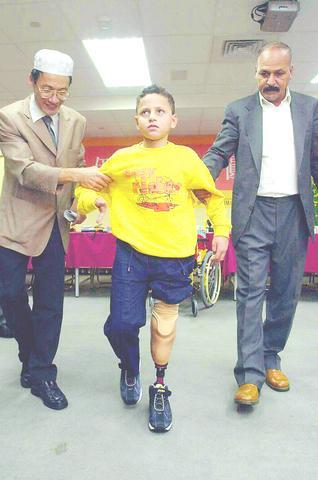The maimed 12-year-old Iraqi boy who came to Taiwan for treatment in late October will get an artificial hand and leg, the hospital where he is being treated said yesterday.
Khaldon-Kh-Thiab lost his right hand and left foot in a US bombing raid during the recent war in Iraq. His right thumb remained intact but he has no fingers, and his left leg was amputated from the knee at an Iraqi hospital.
The Eden Social Welfare Foundation arranged for the boy and his father to come to Taiwan. He is scheduled to stay here for two months for treatment at the Far Eastern Memorial Hospital (亞東醫院)

PHOTO: CHIANG YING-YING, TAIPEI TIMES
The hospital said that, after discussions with the father and the son, the medical team would keep Khaldon-Kh-Thiab's right thumb and provide an artificial hand with four fingers. Originally the hospital also suggested giving up the right thumb and giving him a mechanical hand so the boy could have better movement, but the father rejected this option because he was worried about what it would look like.
The hospital will also give Khaldon-Kh-Thiab an artificial leg that is extendable so he can continue to use it as he grows up.
Khaldon-Kh-Thiab has already started light rehabilitation. When he first came he could only sit in the wheelchair, but yesterday he put on the artificial leg and could walk for a little with assistance. He also did not shy from the media as he did when he first arrived.
"I am really happy and I like my artificial leg," he said.
"I hope I can return home soon to show my family and friends my new leg."
He was also given a digital camera as a present yesterday, and he immediately used the camera to shoot the reporters around him, using his right thumb to push the shutter.
"I really like Taiwan and I want to shoot Taiwan's scenery so I can share it with people back home," he said.
His father said that there were many more Iraqi children who suffered similar injuries and he hoped those children will get help as well.

US President Donald Trump said "it’s up to" Chinese President Xi Jinping (習近平) what China does on Taiwan, but that he would be "very unhappy" with a change in the "status quo," the New York Times said in an interview published yesterday. Xi "considers it to be a part of China, and that’s up to him what he’s going to be doing," Trump told the newspaper on Wednesday. "But I’ve expressed to him that I would be very unhappy if he did that, and I don’t think he’ll do that," he added. "I hope he doesn’t do that." Trump made the comments in

Tourism in Kenting fell to a historic low for the second consecutive year last year, impacting hotels and other local businesses that rely on a steady stream of domestic tourists, the latest data showed. A total of 2.139 million tourists visited Kenting last year, down slightly from 2.14 million in 2024, the data showed. The number of tourists who visited the national park on the Hengchun Peninsula peaked in 2015 at 8.37 million people. That number has been below 2.2 million for two years, although there was a spike in October last year due to multiple long weekends. The occupancy rate for hotels

A cold surge advisory was today issued for 18 cities and counties across Taiwan, with temperatures of below 10°C forecast during the day and into tonight, the Central Weather Administration (CWA) said. New Taipei City, Taipei, Taoyuan and Hsinchu, Miaoli and Yilan counties are expected to experience sustained temperatures of 10°C or lower, the CWA said. Temperatures are likely to temporarily drop below 10°C in most other areas, except Taitung, Pingtung, Penghu and Lienchiang (Matsu) counties, CWA data showed. The cold weather is being caused by a strong continental cold air mass, combined with radiative cooling, a process in which heat escapes from

Snow this morning fell on Alishan for the first time in seven years, as a strong continental cold air mass sent temperatures plunging across Taiwan, the Central Weather Administration (CWA) said. The Alishan weather station, located at an elevation of about 2,200m in central Taiwan, recorded snowfall from 8:55am to 9:15am, when the temperature dropped to about 1°C, the CWA said. With increased moisture and low temperatures in the high-altitude Alishan area, the conditions were favorable for snow, CWA forecaster Tsai Yi-chi (蔡伊其) said. The last time snow fell at the Alishan weather station was on Jan. 10, 2018, while graupel fell there